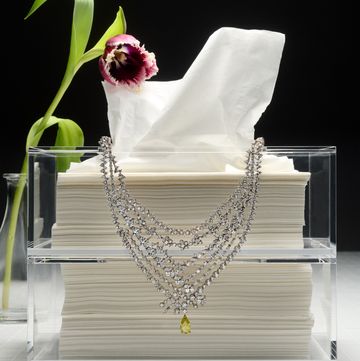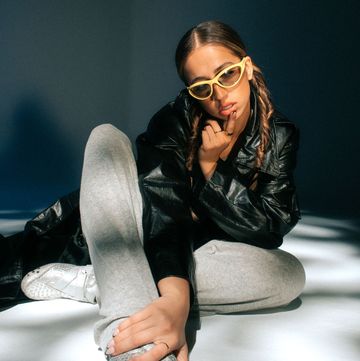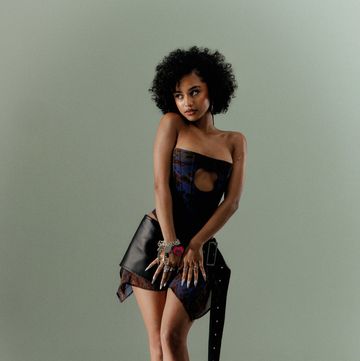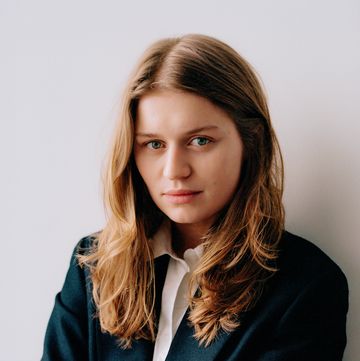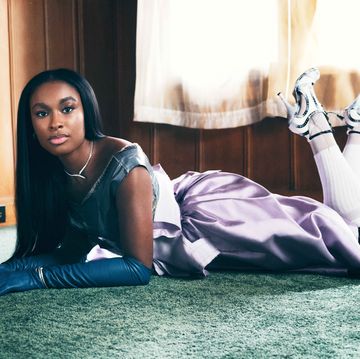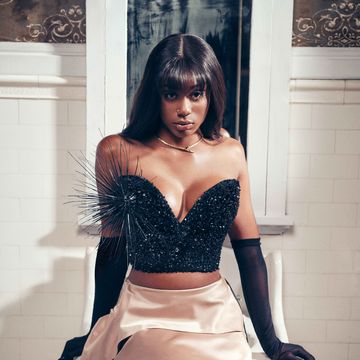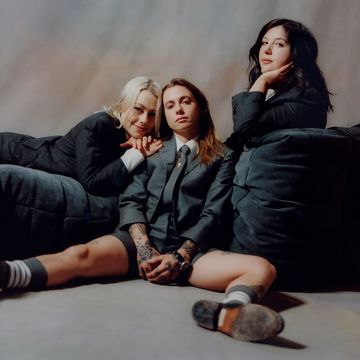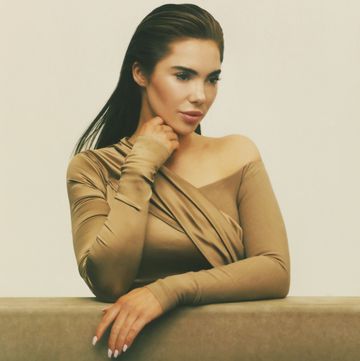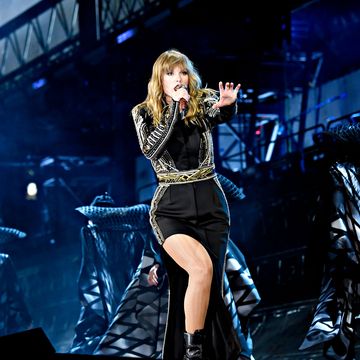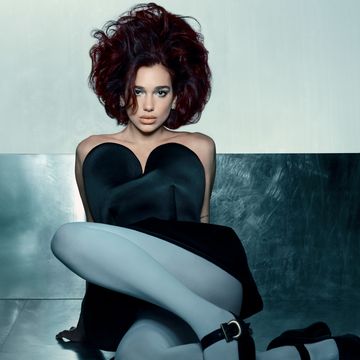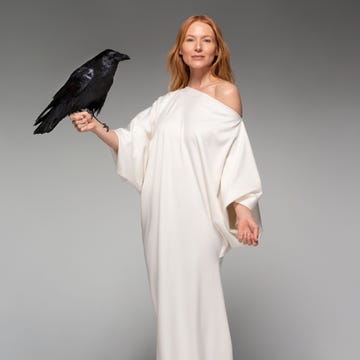On the one-year anniversary of the election of Donald J. Trump, Rose McGowan was driving through rural Colorado, on her way to “wherever I felt like going next,” when she got pulled over for speeding by a local cop. It was a tense moment for McGowan—her heart was racing—because there was a warrant out for her arrest, stemming from charges that an item she’d left behind after a flight to DC in January contained narcotics. In McGowan’s low, sultry voice, she explained to the officer that the warrant was a result of the craziest story he’d ever hear: She believed she’d been targeted by a years-long campaign against her by private investigators, who’d been assigned to paint her as a deranged, hysterical, drug-addicted has-been. The man paying for these dark ops, she believed, was Harvey Weinstein, who, until recently, was one of the most powerful producers in Hollywood. And it just so happened that just a few weeks earlier, she had helped finally expose him as a serial predator.
Before the cop wrote her a ticket and sent her on her way, McGowan asked him where she could get a good cheeseburger. “I was hungry,” she says, her shrug almost audible over the telephone.
This is not an episode of Alias. This is the real life of actress and artist Rose McGowan, whose reputation transformed almost overnight in October from crazy outsider with an ax to grind to avenging feminist superhero. She is the most outspoken of the 80-plus women who have publicly accused Weinstein of sexual assault and harassment. And she’s become a leader in our national reckoning with the patriarchy and its power over women.
It’s a surprising turn for McGowan, 44, who’s never been a leading lady, nor well served by Hollywood’s feminist establishment. No Gwyneth in pink Ralph Lauren was she; you knew her because she dated Marilyn Manson, wore red-carpet non-dresses, and starred in vampy ads for women’s clothing chain Bebe. To hear her tell it—and for years she was known for telling it—she was a girl who was taken advantage of by man after man. She got messed with one too many times, and then she got mad. Really mad. Not the kind of mad in which you write a personal essay for Lenny Letter and call it a day. Rose McGowan shaved her head, cranked up her Twitter, and went to war.
“For years, I’ve been punching at these idiots,” McGowan tells me. “And I have better things to do, like just exist in my own life. How about that? I was waiting for years for somebody else to do this. Waiting. And then I was like, goddammit, it’s me. There’s nobody else who has the skill set. There’s nobody else who knows what I know. Or there are a lot of us who know what I know, but they weren’t necessarily born with a sword in their hand.”
Rose Arianna McGowan, in fact, was born in 1973 in a barn in Italy, delivered by “a blind midwife,” or so she’s been told. Her parents, Danny and Terri, were itinerant members of the infamous Children of God cult. “I really have almost no citizenship; my documents were all fake,” McGowan tells me. “There’s no record of my birth. I’ve never even seen a Social Security card.” McGowan had answered the door to her New York apartment dressed like a cat burglar in a black top and matching leggings. Her very closely cropped hair, once viewed as radical, in retrospect befitted the battle to come.
Though McGowan was close to her father and describes him as inspirational, she remembers being disturbed by the rampant misogyny around her as a young girl. “It was patriarchal, let’s just put it that way,” McGowan says of Children of God, whose members had sex with each other’s spouses as well as teenagers. “I would look at them [the women] at a very young age, and look at him [her father] and look at them, and I would just think, What? You’re worshiping that? It didn’t make any sense. I vowed never to worship a man.”
McGowan is the second oldest of six children and has two other half siblings. She was 10 when her family broke from the cult and arrived in Gig Harbor, Washington. Her first real job was at a funeral home at age 14. “That’s where I learned set decor and lighting. I’d try to get a vibe off a dead body,” she says with a laugh. “But looking back, I could’ve lived without seeing certain things. I’ve had a lot of trauma.”
As she pads around her apartment, McGowan has the upright posture and slight turnout of a dancer—an old-world presence, like a character in a Daphne du Maurier novel. Her childhood friend, the actor and screenwriter Joshua John Miller, says she’s always had that aura. “There was this sense that Rose was meant to do something really grand. She carried herself with such self-importance, like she had a messiah complex at 15. But I didn’t think she was deluded. I believed there was a great destiny for her.”
There was also something alarming about the way men responded to the very young McGowan’s natural magnetism. Her aunt Rory McGowan remembers a Valentine’s Day when she let 12-year-old Rose wear red lipstick for dinner at a local Chinese restaurant. “There was a table of men who kept looking toward us,” Rory tells me. “I was used to men looking at me, but I was with my husband and a baby. Then I realized they were all looking at Rose. I remember being so upset that I couldn’t eat. They were just leering at her.”
McGowan started dabbling in acting mostly as a means of escape from the tedium of high school. In 1990, she scored a spot as an extra in the sci-fi teen flick Class of 1999, which was shot in Seattle and was where she met fellow teen actor Miller. “She was this pixie woman,” he says. “This young girl who had already blossomed physically. So she was like a walking hazard, basically.”
Throughout high school, she went on the occasional movie audition, including one for an Oscar-nominated director. “I slept with him when I was 15 years old, or he slept with me,” she says. “After I auditioned for him, he showed me a soft porn that he’d shot. And then slept with me. I was attracted to him, but then I look back and I think, You were in your midtwenties, and I was 15.” At 18, she began dating music executive Brett Cantor, in whom she thought she’d found a kindred spirit. But in 1993, she found herself shattered when Cantor was tragically stabbed to death.
McGowan’s first leading role was in 1995’s The Doom Generation. In the movie, her femme fatale character has a threesome with both male leads. In another scene, a neo-Nazi rapes McGowan’s character on top of an American flag, then cuts off her boyfriend’s penis and shoves it down his throat, before she murders him in revenge. “It was a very cruel movie,” recalls Rory McGowan, “and it put this very young girl’s head in a really weird place.”
In the winter of 1997, McGowan says, she was raped by Weinstein. The actress was at the Sundance Film Festival promoting the soon-to-be massively successful teen horror movie Scream. There was a camera crew following her that day, for an MTV day-in-the-life special that never aired.
McGowan arrived at Harvey Weinstein’s room at 10 a.m. for an ostensible business meeting. Before entering, “I turned to the camera and I said, ‘I think my life is finally getting easier!’” Her eyes fill with tears as she recalls the scene. “I was very mad at myself about that—like I cursed myself with that simple line, that it was me who did it, that I jinxed my life.”
By now, McGowan has told the story dozens of times. “Everybody, looking back, was part of a setup. The assistants that came out of the room before I went in. Everybody,” she says. Once she and Weinstein were alone, “I was pushed into a tiny room,” she says. “I froze. He’s giant. He’s about 6'4" by 6'4". She describes feeling as if she were watching herself from above. “In health class, they never talked to boys about not raping, but they did tell girls that the best way to survive was to just submit to it,” she says. “Surrender, or you’ll get killed. But the thing is, it kills you anyway.”
After the alleged assault, which Weinstein has denied, he eventually paid McGowan $100,000. McGowan says she anonymously donated the settlement fee to a domestic-abuse charity. “I didn’t want any of his money in my account. It was my only way of saying, ‘No, I didn’t want this.’”
The following year, McGowan made her first attempt at rejecting the Hollywood mainstream. She “ran away” on tour with rock star Marilyn Manson for three and a half years. The satanically styled Manson seemed like a perfect match for McGowan, who, thanks to films like Jawbreaker, had taken on the image of a goth diva. The couple eventually became engaged, and it was on Manson’s arm that McGowan seared herself into America’s retinas by wearing the original sheer-beaded “naked dress” on the 1998 MTV Video Music Awards red carpet.
In 2001, McGowan broke off the union, citing “lifestyle differences.” “I had no money,” she explains. “So that’s when I did the TV show.” Her role as a suburban witch on the WB’s Charmed was supposed to be a financial stopgap; instead, it stretched on for six years.
McGowan gets up to adjust the dimmer on the living room lights, shorn head held high. “I got lost, really lost,” the actress continues, citing 100-hour work weeks. “I had no time to actually reflect.”
The end of her run on Charmed in 2006 coincided with the beginning of McGowan’s relationship with director Robert Rodriguez. On paper, this was another couple that made sense. Rodriguez was a fringe auteur who’d been accepted into the mainstream thanks to people like—yes—Harvey Weinstein, who financed four of his films, including cult hits like From Dusk Till Dawn and Sin City. In reality, McGowan says, the relationship (they, too, were eventually engaged) was the one time in her life when she found herself falling into the subservient-woman paradigm that had so repulsed her as a girl. He’s “a very powerful dude,” she says. “Who has a lot of people snowed—he snowed me.”
While she and Rodriguez were dating, he cast her in Grindhouse, the high-concept double-feature horror flick he codirected with Quentin Tarantino. It was during a 2007 Rolling Stone cover shoot for the movie that McGowan had a feminist awakening. She was on set, waiting to get dressed, when she realized, “There was nothing on the rack except for two belts of bullets. I was like, where are the clothes?” Ultimately, the cover featured McGowan and Rosario Dawson, bare ass cheek to bare ass cheek, naked save for prom queen–like sashes of bullets across their chests. The cover read, “Very Bad Girls: Welcome to Grindhouse, the Most Violent Chick Flick Ever.” McGowan had a moment of clarity: “I was the thing set to make you feel like you weren’t quite good enough and I was going to steal your boyfriend,” she says. “I was the thing that got every message dispersed through the airwaves and the ether to girls. I was ground zero for it. I’ve seen it. I am it. And it enrages me.”
From that moment, McGowan tried to go her own way. She wrote a TV series based on her Children of God upbringing, and with her old friend Joshua John Miller, she directed the short film Dawn, which was nominated for the Sundance Grand Jury Prize. “It wasn’t like she was ever unaware of the patriarchy,” Miller says. “But escape is something that takes years to plot and plan.”
But whispers in Hollywood were turning McGowan’s self-exile into something darker: She was known increasingly as a loose cannon—too extreme to risk a project on. “I thought Rose was fucking epic,” says Amy Emmerich, chief content officer at Refinery29, who has been a supporter of McGowan’s art and activism for years. But when Emmerich would attempt to hook McGowan up with other women for creative projects, “They’d say, um…she’s too radical. She’s too pushy. And these are other feminist women! There was something about what Rose was saying that was so harsh, people couldn’t wrap their heads around it.”
Instead of allowing herself to be marginalized, McGowan built her own platform. She called it the Rose Army, a community of equally fed-up women (and some men) who banded together online and with the occasional in-person summit, with the tagline “Be a Thorn. Enlist!” Together, they would drag institutionalized sexism into the sunlight.
In June of 2015, McGowan tweeted a screen shot of a casting note she’d received for an Adam Sandler movie. It instructed auditioning actresses to show up in “form fitting tank that shows off cleavage (push up bras encouraged).” “The idea that these gorgeous women are wildly attracted to this infantile douchebag?” McGowan says now. “What he represents is the gross directors and producers that think they have a right to a 10 because they exist.” The tweet blew up. “I was like, wow—you think that is a big deal? Let me tell you what’s really going on.…”
From that point on, McGowan’s focus shifted to activism. She began stoking her brand of benevolent rage on Twitter with almost round-the-clock rants speaking truth to power, growing a rabid following that now hovers around 900,000. On Instagram on November 19, 2015, she documented shaving her head as an act of defiance against conventional beauty standards. She also began writing her memoir, Brave (out this month from HarperCollins), which expands upon McGowan’s unusual childhood and likens it to what she sees as the cult of Hollywood; recording an album; and working on a skin-care line with her aunt Rory. By 2016, she turned her energy to the presidential election and advocating for Planned Parenthood and women’s rights. The day after Trump won in November, McGowan and Emmerich landed in Lisbon, Portugal, for a Refinery29 summit. “We were all frozen,” Emmerich says. “But Rose called it out. She was like, you will see swastikas in the streets before you know it—she was already there.”
When it came to Weinstein, though, McGowan thought she could only leave bread crumbs. She believed—incorrectly, it would turn out—that her 1997 settlement included a nondisclosure clause. So McGowan initially hurled hints instead. As part of a October 2016 tweet storm using the hashtag #WhyWomenDon’tReport, she wrote, “It’s been an open secret in Hollywood/Media & they shamed me while adulating my rapist,” followed by “Because my ex sold our movie to my rapist for distribution.”
Her strategy worked: By March of 2017, McGowan was in touch with the reporters who would eventually break the Weinstein story: Jodi Kantor and Megan Twohey at the New York Times, and Ronan Farrow, working initially for NBC and then for the New Yorker. “Shaunna Thomas from [feminist activist organization] UltraViolet called, and I told her about HW the Monster,” McGowan tells me. “I said I have a book coming out, and he’s already started to harass me behind the scenes.” A month later, McGowan says, Thomas suggested she speak to Kantor, but McGowan hesitated. She didn’t like the way the paper had most recently covered her, describing her as a “self-appointed” activist after she attended (and made a willfully disruptive scene at) a bipartisan political dinner in New Hampshire. But once she agreed, she says, Kantor and Twohey turned out to be “amazing.” In Farrow’s case, she says, “I asked him if he could be brave. He said yes.” It was important, McGowan says, to have journalists from competing publications vying for the story. “The Monster,” she says, referring to Weinstein, “exerts intense pressure. So I had to get in two places, to basically be in the running with each other.”
On October 5, 2017, the Times published the first story detailing allegations of Weinstein’s three-decade history of sexual harassment and assault, for which McGowan now says she was one of the primary sources. Further reporting by Ronan Farrow in the New Yorker added to the growing list of Weinstein accusers. Farrow also detailed the mind-boggling lengths to which Weinstein allegedly went to intimidate his victims. In McGowan’s case, as he reported, that included compiling a list of her past lovers, recruiting reporters to interview everyone in her network, paying an agent to pose as a women’s-rights activist in order to get close to the actress, offering a bonus for advance text of her memoir, and having her tracked by former agents of the Israeli spy service Mossad. Farrow later reported that McGowan’s lawyer has argued that drugs could have been planted in her wallet, which was inadvertently left on a flight to DC last January, leading to her entanglement with the Virginia police. She has since turned herself in, but she told Farrow that when her court date is assigned, she will “clearly” be pleading not guilty. (Weinstein’s legal team tells ELLE that “Mr. Weinstein categorically denies ever engaging in any non-consensual sexual conduct with anyone, and any suggestion that he acted improperly to defend himself against such claims is simply wrong.” Weinstein’s spokeswoman told the New Yorker, “It’s a fiction to suggest that any individuals were targeted or suppressed at any time.”)
McGowan says in the week leading up to the Times exposé, Weinstein’s representatives offered her a re-up of $1 million to buy the silence that—as she had recently discovered—was not required under her settlement. She ultimately turned the offer down. Suddenly, she was newly empowered to become a leader of the movement she’d long been working to spark. Over the following weeks, she became a prominent figure in the sweeping online #MeToo campaign, through which hundreds of thousands of women across America have come together to call out their abusers and harassers.
“Identifying with one another, knowing you’re not alone—it destroys all my fears, all my shame, the darkest, most painful secret in my life, and Rose gave me the power to do that,” the Italian actress, director, and fellow Weinstein accuser Asia Argento told me. “We have to be warriors in a man’s world. With Rose, I feel totally protected, and I would take a bullet for her.”
The last time I meet with McGowan is a few weeks after the Weinstein scandal has broken. As the maelstrom swirled, she’d flown to Hawaii, where she threw her phone into the ocean, she says, “and just recharged.” Now she’s back in L.A. for a short stint and will be leaving the next morning for the Women’s Convention in Detroit. McGowan’s canyon home is as tasteful and subtly weird as its owner. (Near the entrance hangs a neon light installation of a bound woman jumping up and down in a brightly colored cage.)
McGowan is wearing an oversize T-shirt as a makeshift dress on her small frame and comically large, furry slippers. She’s let her hair grow out into a Jean Seberg pixie. “It’s really sad that for the first time, almost in my life, people have looked at me like I’m not insane,” she says. She refills our glasses of white wine and smiles.
“Men in general, and the bad women out there, hate [me] now at their own peril,” she warns. “Because what I’ve done is give a voice to women, to show them that it’s okay to be angry. People are terrified of me—they’re so threatened by somebody being angry, because you know what? You’re angry, too.”
Recently, McGowan has found herself in demand in Hollywood like never before. But she’s not having it.
“It’s really funny the people that have reached out, thinking I wanna star in movies,” she says. Even her ex-fiancé Rodriguez got in touch, suggesting she star in or codirect a film with him. His pitch, she says, was “I could have my own Furiosa!”—a reference to the Mad Max heroine.
McGowan cackles. “I wanna be like, bitch, I am Furiosa. I don’t need to play her in a movie. I shatter things in real life.”
This article originally appears in the February 2018 issue of ELLE.



